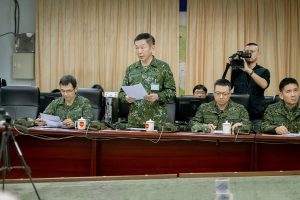Taiwan’s top military official was among eight people killed in an air force helicopter crash in mountainous terrain outside Taipei on Thursday, the defense ministry said. Five others survived.
As chief of the general staff, General Shen Yi-ming was responsible for overseeing the self-governing island’s defense against China, which threatens to use military force if necessary to annex what it considers part of its territory.
The helicopter was flying from Taipei to the nearby city of Yilan for a New Year’s activity when it crashed. The victims included other senior military officials and the two pilots.
The UH-60M Black Hawk with 13 people on board dropped from the radar screen 10 minutes after takeoff from Songshan air force base around 7:50 a.m., Taiwan’s defense ministry said. It went down in the mountainous, heavily forested Wulai area southeast of the capital.
Shen, 63, had taken over as chief of the general staff in July after serving as commander of Taiwan’s air force, which is undergoing a substantial upgrade with the arrival of the most advanced version of the U.S. F-16V fighter.
Alexander Huang, a strategic studies professor at Tamkang University in Taiwan who had known Shen for a decade, said he had stood out as a pilot and an officer.
“He was very calm and very stable and unlike other army guys he was always smiling, so he got a specific leadership style that also made him a popular leader in the entire military,” Huang said.
It will likely be months before the cause of the crash is known, but the pilots appeared to have been highly experienced.
“Of course, reasonable people would think in the direction of mechanical failure or maintenance problem, but without proof you can’t say anything,” Huang said.
A special government committee will look into the cause of the crash, a defense ministry statement said.
According to Taiwan’s Central News Agency, the remaining Black Hawk helicopters have been grounded pending safety inspections. A total of 52 Black Hawks — the air force fleet of 14, the army’s 30, and eight used by the National Airborne Service Corps – will be out of commission pending “inspections of dynamic, radar and control systems, as well as fuselage structure,” CNA cited a military spokesperson as saying.
In a previous incident in February 2018, a Black Hawk helicopter operated by the NASC crashed near Orchid Island, killing six. The copter had been on a medical evacuation mission, transporting a patient from Orchid Island.
Taiwan’s military has operated Black Hawk helicopters for decades and completed a sale for another 60 UH-Ms from the United States for $3.1 billion in 2010. The one that crashed on January 2 was a model dedicated to search and rescue and had been delivered in 2018, according to the ministry. The NASC is expected to receive another six Black Hawks in August 2020, completing the 2010 order.
The loss of Shen and other high-ranking officials will require a rapid reshuffle of positions, but should have minimal effect on Taiwan’s January 11 elections for president and lawmakers, said Andrew Yang, a former deputy defense minister who said Shen was highly respected throughout his career.
“I don’t think the crash will have a strong impact over the elections but certainly it will affect the armed forces because so many senior officers passed away as a result of this crash,” he said.
Incumbent President Tsai Ing-wen appears on track to win a second term over her more pro-China opponent, Han Kuo-yu of the main opposition Nationalists or KMT. In the final poll released before a 10-day pre-election blackout, Tsai had a commanding 16 percentage point lead over Han – and that was the narrowest gap among all the polls released this week.
Tsai visited the crash site in Yilan on January 2. Her ruling Democratic Progressive Party said in a statement on social media that all its public campaign events from now through Saturday would be cancelled.
“The loss of pillars of our country make us feel endless sorrow,” the statement read.
The KMT also planned to suspend campaign events for two days, and Han issued a statement mourning the victims of the crash and asking for prayers for the five survivors.
By Ralph Jennings for The Associated Press with additional reporting by The Diplomat.

































